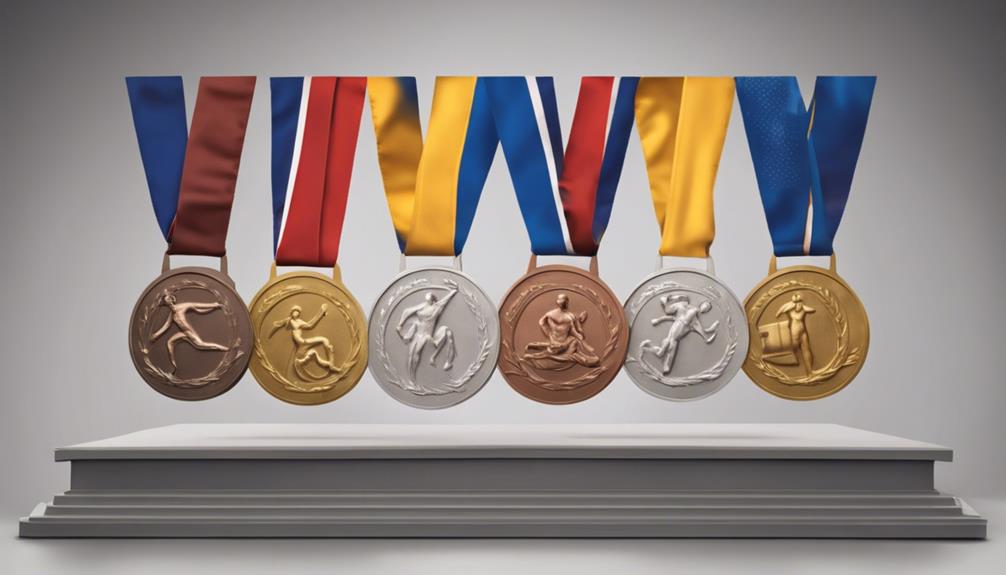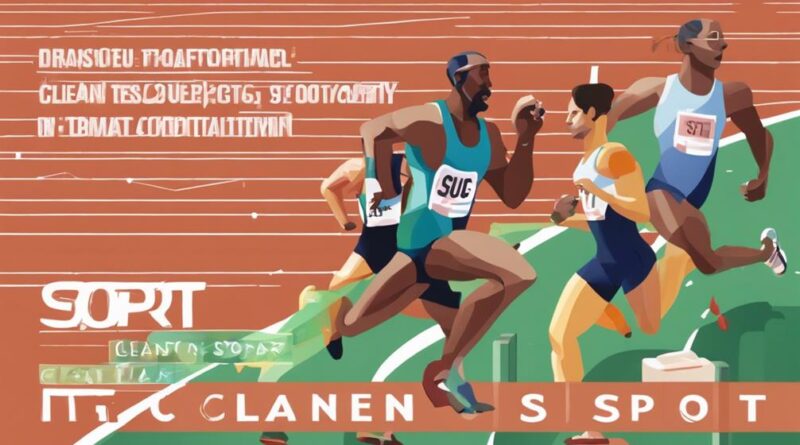5 Best Practices: Anti-Doping Policies in Athletics
When it comes to anti-doping policies in athletics, the case of the Russian doping scandal serves as a stark reminder of the importance of stringent measures in preserving the integrity of sports. From implementing robust testing protocols to educating athletes on the risks and consequences of doping, there are several best practices that organizations can adopt to combat this issue effectively.
However, one crucial aspect often overlooked is the role of collaboration with international bodies like the World Anti-Doping Agency. This partnership not only ensures consistency but also elevates the standards of fairness and integrity in sports.
Importance of Anti-Doping Measures
Understanding why anti-doping measures are crucial in athletics is essential for maintaining the integrity of sports competitions. Doping prevention is a key aspect of ensuring fair play and protecting the health of athletes. Athletes who resort to performance-enhancing substances not only gain an unfair advantage over their competitors but also jeopardize their own well-being in the pursuit of success.
Implementing strict anti-doping policies is necessary to uphold the principles of equality and sportsmanship. By deterring athletes from using banned substances, these measures help level the playing field and promote a culture of clean competition. Athletes who choose to enhance their performance through hard work and dedication deserve to compete on an equal footing with their peers, without the interference of artificial aids.
Furthermore, doping prevention is essential for safeguarding the reputation of sports. Spectators, sponsors, and governing bodies place their trust in the authenticity of athletic performances. Any hint of doping not only undermines the credibility of individual athletes but also taints the entire sport. To maintain the trust of stakeholders and preserve the purity of sports, robust anti-doping measures must be in place and strictly enforced.
Key Components of Doping Policies
To effectively combat doping in athletics, doping policies must consist of clear rules and regulations enforced through rigorous testing protocols. Education plays a crucial role in ensuring athletes are aware of the dangers and consequences of doping. Prevention measures are essential to create a clean and fair sporting environment for all participants.
- Education:
Athletes should undergo regular anti-doping education programs to understand the risks associated with doping and the importance of maintaining the integrity of the sport.
- Testing Protocols:
Implementing thorough and random testing procedures is vital to deter athletes from using prohibited substances and to detect any violations effectively.
- Sanctions:
Clearly defined consequences for doping violations, including suspensions and disqualifications, act as a deterrent and ensure a level playing field for all competitors.
Role of Athlete Education Programs
Athletes are integral to the success of anti-doping policies, and their understanding of the risks associated with doping is fostered through comprehensive education programs. Athlete engagement is crucial in ensuring that athletes are well-informed about the dangers of doping and the importance of fair play in sports. Educational resources play a vital role in providing athletes with the knowledge and tools necessary to make informed decisions and resist the temptation to use performance-enhancing substances.
Athlete education programs should cover a wide range of topics, including the potential health risks of doping, the ethical implications of cheating, and the consequences of violating anti-doping policies. By engaging athletes in these programs, sports organizations can create a culture of accountability and integrity within their sport. These programs should be interactive and engaging, utilizing various formats such as workshops, online courses, and informational materials to cater to different learning styles.
Moreover, educational resources should be easily accessible to athletes at all levels, from grassroots to elite. By making information readily available, organizations can ensure that athletes have the knowledge they need to compete clean and make ethical choices. Overall, athlete education programs are a cornerstone of effective anti-doping efforts, empowering athletes to uphold the values of fair play and sportsmanship.
Implementing Stringent Testing Protocols
Implementing stringent testing protocols is essential to maintaining the integrity and fairness of athletic competition. Athletes must adhere to strict anti-doping regulations to ensure a level playing field for all competitors. To achieve this, several key measures should be implemented:
- Testing Frequency: Regular and unannounced testing is crucial to deter athletes from using performance-enhancing substances. By conducting tests frequently, the likelihood of detecting doping practices increases, serving as a strong deterrent for potential cheaters.
- Transparency Measures: Transparency in the testing process is vital to uphold the credibility of anti-doping efforts. Athletes should be informed about the testing procedures, their rights, and the potential consequences of non-compliance. This transparency builds trust and confidence in the anti-doping system.
- Advanced Testing Technologies: Utilizing cutting-edge testing technologies can enhance the detection capabilities of anti-doping agencies. These advancements allow for more accurate and reliable testing, leaving no room for athletes to evade detection through loopholes or outdated methods.
Collaboration With World Anti-Doping Agency
How can effective collaboration with the World Anti-Doping Agency enhance the integrity of athletic competition?
Global partnerships are crucial in the fight against doping in sports. By working closely with the World Anti-Doping Agency (WADA), athletic organizations can tap into a wealth of expertise and resources that help in the development and implementation of robust anti-doping policies. Collaborating with WADA ensures that best practices are shared and implemented uniformly across different sports and regions, contributing to a level playing field for all athletes.
Policy enforcement is another key aspect of collaboration with WADA. By aligning with the World Anti-Doping Code and following WADA's guidelines, sports organizations can strengthen their anti-doping measures and ensure compliance with international standards. WADA provides support in setting up effective testing programs, conducting investigations, and imposing sanctions on violators. This cooperation not only deters athletes from using prohibited substances but also safeguards the reputation of sports by promoting fairness and transparency.
Ensuring Fairness and Integrity
To uphold the principles of fairness and integrity in athletic competition, it's essential to prioritize transparent and stringent anti-doping measures. Adhering to ethical standards and ensuring a level playing field for all athletes are paramount. By implementing robust anti-doping policies, sports organizations can maintain the integrity of their competitions and protect the rights of clean athletes.
Three key practices to ensure fairness and integrity in anti-doping policies:
- Regular Education and Awareness Campaigns: Educating athletes, coaches, and support staff about the dangers of performance enhancement drugs and the importance of upholding ethical standards is crucial. By raising awareness, organizations can deter individuals from engaging in doping practices and promote a culture of clean sport.
- Stringent Testing Protocols: Implementing thorough and random testing procedures is essential to detect any violations of anti-doping regulations effectively. By conducting frequent and unannounced tests, organizations can deter athletes from using prohibited substances and maintain the credibility of their competitions.
- Collaboration with Independent Anti-Doping Agencies: Working closely with reputable anti-doping agencies can enhance the transparency and credibility of testing processes. Independent oversight helps ensure that anti-doping measures are applied fairly and consistently, aligning with ethical standards and promoting trust among athletes and the public.
Consequences for Violations

Violating anti-doping policies in athletics results in immediate consequences for athletes. Athletes are expected to adhere to strict rules and regulations to ensure fair competition. When these policies are breached, disciplinary actions are swiftly implemented to uphold the integrity of the sport and protect the health of all competitors.
Athletes have a responsibility to be aware of the anti-doping policies in place and to comply with them at all times. Any violation, whether intentional or unintentional, can lead to severe repercussions. Disciplinary actions for anti-doping violations may include temporary suspension from competition, fines, loss of rankings, and even disqualification from events. These consequences serve as a deterrent to prevent doping practices and maintain a level playing field for all athletes.
It is crucial for athletes to understand the seriousness of their responsibilities in relation to anti-doping policies. By staying informed, following guidelines, and being vigilant about the substances they consume, athletes can avoid unintentional violations. Continuous education and awareness about anti-doping regulations are essential to prevent violations and protect the integrity of athletic competitions. Remember, as an athlete, you play a significant role in upholding the values of fair play and sportsmanship in athletics.
Continuous Monitoring and Updates
To ensure the effectiveness of anti-doping policies in athletics, continuous monitoring and regular updates are essential safeguards that help maintain the integrity of the sport and uphold fair competition. By implementing a system of regular evaluations, organizations can stay ahead of emerging doping trends and adjust their policies accordingly. This proactive approach not only deters potential cheaters but also demonstrates a commitment to clean and ethical competition.
Here are three key practices to consider for continuous monitoring and updates:
- Utilize Advanced Testing Methods: Stay abreast of technological advancements in anti-doping testing to detect new performance-enhancing substances effectively.
- Engage Stakeholders: Regularly consult with athletes, coaches, medical professionals, and anti-doping experts to gather feedback on current policies and identify areas for improvement.
- Flexible Policy Adjustments: Be prepared to make quick and effective policy adjustments in response to new doping challenges or changes in the competitive landscape.
Frequently Asked Questions
Can Athletes Use Over-The-Counter Supplements Without Risking a Positive Doping Test Result?
Yes, athletes can use over-the-counter supplements, but there are risks involved. Supplement regulations vary, and some products may contain banned substances that can lead to a positive doping test result.
To avoid this, it's crucial to research and choose supplements from reputable brands that provide detailed ingredient information. Always consult with a healthcare professional or a sports dietitian to ensure the supplements you use are safe and compliant with anti-doping policies.
Are There Any Specific Guidelines for Athletes Competing in Different Sports When It Comes to Anti-Doping Policies?
When it comes to anti-doping policies, different sports have their own specific regulations in place. These rules are designed to ensure fair play and uphold the integrity of each sport.
Athletes may be granted exemptions under certain circumstances, but it's crucial to understand and adhere to the guidelines set forth by the governing bodies of your sport.
Stay informed, stay compliant, and compete with integrity.
How Do Anti-Doping Policies Differ Between Amateur and Professional Athletes?
When it comes to anti-doping policies, there are key differences between amateur and professional athletes.
Amateurs may have exclusions that professionals don't, leaving them more at risk for doping violations.
Professionals are usually held to stricter standards, ensuring supplements safety and fair play.
It's essential to understand these distinctions and adhere to the regulations in place to maintain integrity in sports and protect your career.
Are There Any Alternative Methods to Traditional Urine and Blood Testing Being Considered for Detecting Doping Substances?
When it comes to detecting doping substances, novel technologies are constantly being explored. Athlete monitoring is evolving to include methods beyond traditional urine and blood tests.
Researchers are investigating alternative techniques such as hair analysis, biological passport programs, and even artificial intelligence algorithms to enhance the detection of illicit substances. These advancements aim to stay ahead of doping practices and ensure a fair playing field for all athletes.
How Do Anti-Doping Policies Address Potential Conflicts of Interest Within Sports Organizations?
When looking at anti-doping policies, conflicts of interest within sports organizations are a critical concern. Transparency and accountability are key in addressing these issues.
Organizations must ensure that decision-making processes are unbiased and free from any conflicts that could compromise the integrity of anti-doping efforts. By promoting transparency and holding all involved parties accountable, anti-doping policies can maintain the trust of athletes and the public in the fairness of sports competitions.
Conclusion
In conclusion, implementing strong anti-doping measures is crucial in maintaining fairness and integrity in athletics.
By educating athletes, enforcing strict testing protocols, and collaborating with organizations like the World Anti-Doping Agency, sports can remain clean and free of performance-enhancing drugs.
Continuous monitoring and updates to policies are essential to staying ahead of emerging doping trends and ensuring a level playing field for all competitors.
Stay vigilant and committed to upholding anti-doping policies in athletics.
